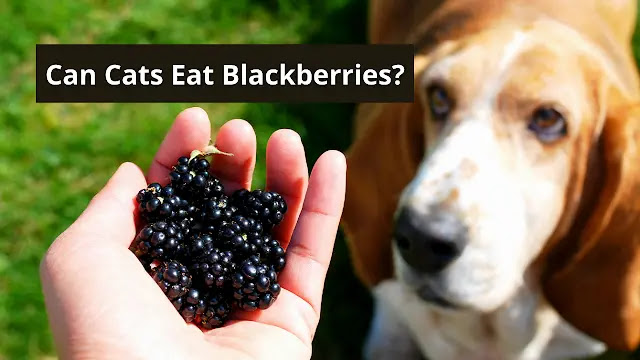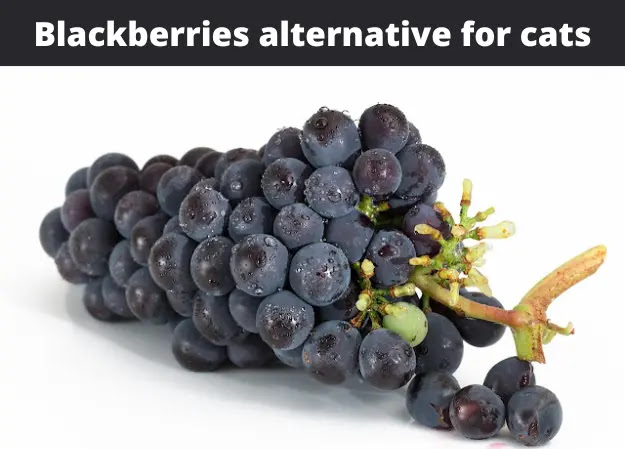Can Cats Eat Blackberries? In today's article, we are going to discuss this.
The short answer Is Yes, house cats can eat other berries. Blueberries, blackberries, raspberries, and cranberries are each safe for house cats to eat. They're high in antioxidants, flavonoids, and fiber, as well as vitamins A, C, K, andE. Be sure to cut each one into bite-size portions before offering to avoid choking hazards.
Can cats eat blackberries?
A cat has become famous for eating blackberries. The lady seems to be enjoying herself but this definitely isn't recommended for your cat.
If your cat tries to eat blackberries, here are some tips on how to prevent them. There have been quite a few anecdotes over the years about cats trying to eat blackberries and usually it is safe to assume that these blackberry stories are true. Cats are the only mammals that are unable to digest the entire berry. It's not that cats don't like blackberries, they just can't digest them. However, for the most part, cats will try to eat anything. And once they've tried it, they might start begging for it to be added to their regular diet.
Related article: High protein dog foods: The top 10 dog foods
If you are worried about a cat eating blackberries, there are several solutions to prevent a cat from eating something you don't want them to:
- Keep them away from the blackberry bushes as much as possible. Cats will try to follow a cat's example and try to eat the berries.
- Take a broom or broomstick and shove it in the berry bush as far away from your cat as you can. That way, if your cat does eat a berry, it can't get its entire body into the berry bush, therefore leaving only its head and tail in.
- If your cat wants to get at a berry, you can then scare him/her away by whacking him/her with the broom or a tennis ball. (I have seen this trick work.)
- Again, take a broom or broomstick and put it in the bush as far away from your cat as you can. That way, if your cat does eat a berry, it can't get its entire body into the berry bush, therefore leaving only its head and tail in.
Of course, you can take the matter more seriously and talk to your veterinarian about treating cats that are attempting to eat berries. If your vet determines that your cat does indeed have some kind of dietary problem, then they can recommend ways to deal with it.
If your cat has a history of being a big barker, which many cats do, then a firm bark from you will usually scare him/her away from the blackberry bush.
Blackberries alternative for cats
Blackberries aren't the only berries that cats will try to eat. Strawberries and grapes are often eaten. However, grapes are not as tasty as berries and sometimes the consequences are more painful. In addition, grapes and grapeseed (cashew) can cause a host of other problems.
Another alternative for cats that love grape or grapeseed is apple or tomato kibble. It's hard to imagine, but cats have been known to actually tear up and eat those hard "treat" balls that often contain apple or tomato kibble.
How to prevent your cat from eating poisonous plants
Finally, while many cats may enjoy blackberry bushes, there is another plant that I've seen quite a few cats try to eat. And that's a cactus. If you were to tell most people that their cat would actually try to eat a cactus, they'd probably think that you were joking. But there are definitely plenty of cats that have tried to eat cactus. The most common types of cactus that cats will eat are the types that are in the morning glory family.
It's not that cats don't like morning glory cactus, it's that the cactus needles are very poisonous and toxic to cats. It's important to try to keep your cat out of the cactus bushes. Here are some ways to keep your cat out of the bushes:
- Keep them out of the cactus bushes
- Protect them from cactus spines
- If you suspect they have tried to eat cactus, get them to the vet
- Don't feed them any of the cactus.
Regardless of what your cat may try to eat, I recommend that you keep the cat’s food bowl as far away from the bushes as possible. You don't want to encourage a cat to try to go into the bush to get food.
For more information about keeping your cat safe, Visit the Pet Poison Helpline website, Pet Poison Helpline.
Below is the outline of a cat food label:
Information About Feeding Feline Foods in the Home
The information on this label is very important to know when feeding your cat. Not only can the contents of the food affect your cat's health, but the information on the label can tell you if the food was prepared in a safe manner, and the health of the food may be affected. Here are some important points to know about food in the home:
- Only feed certain foods to cats.
- Keep in mind that some foods can harm or even kill a cat if consumed.
- Certain health conditions may lead your cat to be overweight and unhealthy, including diabetes, obesity, heart disease, osteoarthritis, and cancer. These health conditions may cause certain health issues for your cats, such as digestive problems, digestive acidosis, liver problems, and hairball problems.
- If your cat has a tumor, your veterinarian will want to discuss whether it should be removed. He will also want to know whether your cat should continue to eat, and if so, which foods are safe for your cat.
- Your cat should eat a wide variety of foods, so you need to be certain that the food you feed your cat is nutritionally balanced. Look for a food label that has the R Feeney food analysis report.
- Avoid any diet food for animals that is high in protein or low in fiber. For example, grain-free diets have a lot of fat in them, and they are not good for a cat.
- Don't buy cat food that is flavored, such as bacon flavor, liver flavor, or fish flavor. All these flavors are highly risky to your cat's health.
- Do not allow your cat to eat any food that he has previously become sick or injured after eating.
- Remove weeds and other small plants from your lawn. These plants can contain toxins that can be toxic to cats. In a similar way, don't allow your cat to eat small pieces of clothing, including cotton.
If your cat eats a plant or garden item that is toxic to cats, it is best to consult your veterinarian right away. The veterinarian will most likely use a special form of treatment that will help your cat recover, and it may help to remove the plant or garden item that may be causing your cat to be sick.
Read also: What Happens To Your Body When You Eat Black Rice
If your cat has ingested a plant or garden item that is poisonous to cats, the first thing your veterinarian will want to do is to start an emergency IV. These treatments are designed to flush the food and fluid from the cat's stomach, and this will help the pet to recover from the problem. This treatment is only effective if given soon after a cat eats the plant or garden item that is poisonous to cats. It can take two to four hours for your cat to get over this potentially deadly poisoning, and most cats do not tolerate this treatment well.
Although you should avoid plants that you suspect might be toxic to your cat, it's always best to consult your veterinarian before introducing a new plant to your home. It's also important to remember that animals can suffer and die from eating poisonous plants even if you have no idea what kind of plants are dangerous to them. Although your cat should never consume poisonous plants, you should never intentionally feed your cat a plant that is poisonous to him or her.


